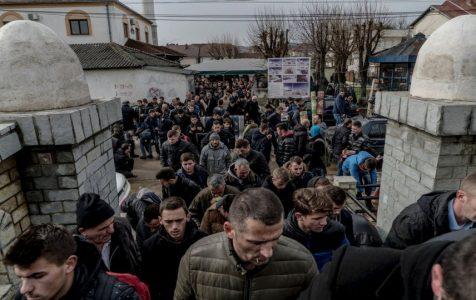
How Kosovo turned into fertile ground for ISIS terrorism
Extremist clerics and secretive associations funded by Saudis and others have transformed a once-tolerant Muslim society into a font of extremism.
Every Friday, just yards from a statue of Bill Clinton with arm aloft in a cheery wave, hundreds of young bearded men make a show of kneeling to pray on the sidewalk outside an improvised mosque in a former furniture store.
The mosque is one of scores built here with Saudi government money and blamed for spreading Wahhabism — the conservative ideology dominant in Saudi Arabia.
Since then — much of that time under the watch of American officials — Saudi money and influence have transformed this once-tolerant Muslim society at the hem of Europe into a font of Islamic extremism and a pipeline for jihadists.
Kosovo now finds itself, like the rest of Europe, fending off the threat of radical Islam. Over the last two years, the police have identified 314 Kosovars — including two suicide bombers, 44 women and 28 children — who have gone abroad to join the Islamic State, the highest number per capita in Europe.
They were radicalized and recruited, Kosovo investigators say, by a corps of extremist clerics and secretive associations funded by Saudi Arabia and other conservative Arab gulf states using an obscure, labyrinthine network of donations from charities, private individuals and government ministries.
“They promoted political Islam,” said Fatos Makolli, the director of Kosovo’s counterterrorism police. “They spent a lot of money to promote it through different programs mainly with young, vulnerable people, and they brought in a lot of Wahhabi and Salafi literature. They brought these people closer to radical political Islam, which resulted in their radicalization.”
After two years of investigations, the police have charged 67 people, arrested 14 imams and shut down 19 Muslim organizations for acting against the Constitution, inciting hatred and recruiting for terrorism. The most recent sentences, which included a 10-year prison term, were handed down on Friday.
After the war, United Nations officials administered the territory and American forces helped keep the peace. The Saudis arrived, too, bringing millions of euros in aid to a poor and war-ravaged land.
But where the Americans saw a chance to create a new democracy, the Saudis saw a new land to spread Wahhabism.
“There is no evidence that any organization gave money directly to people to go to Syria,” Mr. Makolli said. “The issue is they supported thinkers who promote violence and jihad in the name of protecting Islam.”
Kosovo now has over 800 mosques, 240 of them built since the war and blamed for helping indoctrinate a new generation in Wahhabism. They are part of what moderate imams and officials here describe as a deliberate, long-term strategy by Saudi Arabia to reshape Islam in its image, not only in Kosovo but around the world.
Saudi diplomatic cables released by WikiLeaks in 2015 reveal a system of funding for mosques, Islamic centers and Saudi-trained clerics that spans Asia, Africa and Europe. In New Delhi alone, 140 Muslim preachers are listed as on the Saudi Consulate’s payroll.
All around Kosovo, families are grappling with the aftermath of years of proselytizing by Saudi-trained preachers. Some daughters refuse to shake hands with or talk to male relatives. Some sons have gone off to jihad. Religious vigilantes have threatened — or committed — violence against academics, journalists and politicians.
The Balkans, Europe’s historical fault line, have yet to heal from the ethnic wars of the 1990s. But they are now infected with a new intolerance, moderate imams and officials in the region warn.
How Kosovo and the very nature of its society was fundamentally recast is a story of a decades-long global ambition by Saudi Arabia to spread its hard-line version of Islam — heavily funded and systematically applied, including with threats and intimidation by followers.
Muslims in Kosovo, which was a part of the Ottoman Empire for 500 years, follow the Hanafi school of Islam, traditionally a liberal version that is accepting of other religions.
But all around the country, a new breed of radical preachers was setting up in neighborhood mosques, often newly built with Saudi money.
In some cases, centuries-old buildings were bulldozed, including a historic library in Gjakova and several 400-year-old mosques, as well as shrines, graveyards and Dervish monasteries, all considered idolatrous in Wahhabi teaching.
From their bases, the Saudi-trained imams propagated Wahhabism’s tenets: the supremacy of Sharia law as well as ideas of violent jihad and takfirism, which authorizes the killing of Muslims considered heretics for not following its interpretation of Islam.
The Saudi-sponsored charities often paid salaries and overhead costs, and financed courses in religion, as well as English and computer classes, moderate imams and investigators explained.
But the charitable assistance often had conditions attached. Families were given monthly stipends on the condition that they attended sermons in the mosque and that women and girls wore the veil, human rights activists said.
“People were so needy, there was no one who did not join,” recalled Ajnishahe Halimi, a politician who campaigned to have a radical Albanian imam expelled after families complained of abuse.
Source: NYT





